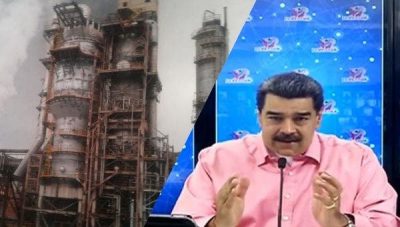US Sabotage of Venezuela Economy. US Ex-Marine Caught Spying on Oil Refineries
President Nicolas Maduro informed that the individual, who carried weapons and cash, had performed duties at CIA bases in Iraq.

A U.S. former marine and spy who had been spying on the Amuay and Cardon refineries was captured in the Venezuelan state of Falcon on Thursday.
Speaking on the twelfth anniversary of the youth wing of the United Socialist Party of Venezuela, the JPSUV, President Nicolas Maduro said the captured individual had served a function at CIA bases in Iraq and was found with weapons and a large sum of cash.
“He was captured with heavy weapons, specialty weapons. He was captured with a great amount of cash in dollars and with other elements which we have sent directly to the public ministry, the prosecutor’s office.”
The President, who said that evidence includes photo and video, stated that one day prior to the capture, Minister Tareck El Aissami, along with a group of experts, of engineers, scientists, discovered and dismantled a plan to set off an explosive at the El Palito refinery.
Details: U.S. marine and spy captured in Falcón, Venezuela, was spying on refineries and had lent services to CIA in Iraq. He was carrying heavy weapons & large sum of cash in USD. Two days ago @TareckPSUV dismantled plot to blow up El Palito refinery. @teleSURenglish pic.twitter.com/SnqwjLP4Cq
— Camila (@camilateleSUR) September 11, 2020
He called for increased security measures in response to this latest aggression.
“Attention workers of the refineries. We must reinforce all of the internal and external security measures of all the processes. Attention. It’s a war of revenge of the gringo empire against Venezuela to impede Venezuela from producing all of the derivatives of petroleum, gasoline, etc.”
“This spy has been captured. This plan was detected, the plan was disassembled. We are 100 percent activated to guarantee the physical security of strategic facilities, our petroleum plants. In the coming hours, I am sure that we’ll find out more about this capture.”
Former US Marine Captured Spying on Venezuelan Refineries – Dismantled Plan to Cause an Explosion in El Palito Refinery https://t.co/Y0CArjCGxU
— Orinoco Tribune (@OrinocoTribune) September 12, 2020
The U.S. government has taken explicit moves to sabotage the Venezuelan economy with its unilateral coercive measures which began under President Barack Obama but which have intensified under the Trump administration.
The sanctions have targeted every aspect of the economy including oil exports, oil tankers and transporters, Venezuelan and foreign banks and companies conducting business with the Bolivarian nation, and have resulted in massive hurdles for the oil-producing country to produce its own gas, with like El Palito reducing operations due to issues stemming from the blockade and the lack of supplies and spare parts.
Reactionary sectors of the Venezuelan opposition targeted state facilities to take down the national electric grid and other important sites in recent years, and new coup efforts by US-backed opposition figure Juan Guaido seek to lure in support by promising a supply of gasoline for the country, despite that Guaido has welcomed criminal sanctions in an aim to cripple the Venezuelan state’s production capacity.
Meanwhile, the Venezuelan government has announced the “Special Contingency Plan for the temporary supply of fuel” for the normalization and regularization of distribution in the short and medium-term.
#Venezuela | #Conviasa workers received #JuanGuaido with angry protests. pic.twitter.com/EvPL0g3JrT
— teleSUR English (@telesurenglish) February 14, 2020
*
Note to readers: please click the share buttons above or below. Forward this article to your email lists. Crosspost on your blog site, internet forums. etc.
Featured image: Venezuela’s El Palito refinery (L) and President Maudro (R). | Photo: teleSUR

